By: Denelle Flake, Farm News Editor
On Monday, December 5th
Merced County Farm Bureau (MCFB) and Fluetsch & Busby Insurance (F&B) received the Select Partners Award at the 104th California Farm Bureau Annual Meeting presented by Nationwide. This newly founded award is given to a local agency and County Farm Bureau that have shown continued collaboration and engagement together over the past year. MCFB and F&B were honored to be the first ever to have received this award.
F&B has been doing business in
Merced County Farm News
Merced County Farm Bureau and Fluetsch & Busby Insurance Receive Select Partners Award at 104th California Farm Bureau Annual Meeting


Merced since 1912. The company is rooted in Merced and has a rich history of community involvement. Over the past couple years, MCFB has had the opportunity to work hand in hand with F&B on a variety of events. Some have included a farmworker safety training day and jointly adopting families from Merced County Human Services Agency for the holidays. It is community partnerships like these that truly further the reach we have as a farm bureau. MCFB looks forward to working with F&B to best serve our local agriculture community and beyond.
MCFB was also recognized as a finalist for the California Farm Bureau Innovator Award for our Rooted in Agriculture Rewards Program. Rooted in Agriculture rewards Merced County TK-6th grade teachers that incorporate agriculture in their classroom. During the life of the program, MCFB has rewarded a total of $6,000 to 12 teachers, which has had an impact on over 600 students. MCFB is excited to offer this opportunity for the fourth year in 2023. More information on how to apply will be available after the new year.

By tenths, Republican John Duarte beats Democrat Adam Gray in close congressional race
Juan Alanis takes oath to join state Assembly
INSIDE: 10 7 16 December 2022 | Volume 115, Number 12
.
WeFarm. You Eat
State Water Project initial allocations set for just 5 percent
MCFB President Joe Sansoni (L) pictured
from the President's Corner
 Joe Sansoni
Joe Sansoni
We held our Board of Directors November/December dinner and meeting on the 1st of this month, and we had a last-minute special guest appearance by Merced County Ag Commissioner Dave Robinson. By the time you read this, Dave will no longer be our Ag Commissioner, as he is retiring after twenty years of service to Merced County. Congratulations to Dave on a job well done and a welldeserved retirement! Dave truly did his best to help us all stay compliant, gave us the tools with which to do so, advocated for our rights to farm, and to safely and correctly utilize approved materials with a minimum of State interference and red tape. He gave us some valuable information and insight into what’s happening in the world of the California DPR. None of it is very good news, as most of us would expect. One of the most important messages he implied upon us was that the County Ag Department and staff are our partners and allies with respect to pesticide regulation. They work very hard to help us and our farming operations stay compliant and out of the line of fire of the State DPR. Realistically, they are our only allies in this arena. Diligent and continual cooperation between growers and the Ag Department is vital for each to be able to do their jobs to the best and fullest extent possible, and to ensure that any accidents or mishaps related to pesticide applications are at the very least held to an absolute minimum! Incidents involving pesticide misapplications or injuries – even minor ones – will only serve to hasten the push by those with influence at the State level to eliminate more of the already dwindling list of available materials in our toolbox here. As an industry, we are
only one accident away from permanently losing the ability to use certain materials, so his message regarding reportable incidents was very clear and concise: “Don’t have any!”

We as an ag industry constantly have a litany of complaints about the ever-mounting plethora of challenges and the burdens of over-regulation we face daily. As is the case in other aspects of life and within other industries, we are often our own worst enemies and create the basis of our own biggest challenges from within. Whether anyone wants to acknowledge it or not, it is an undeniable truth. Responsible pesticide use and regulation is of course necessary from the standpoints of both environmental and human safety. Unfortunately, many of the ridiculously stringent regulations and growing list of banned materials have almost as often been the result of careless use and irresponsible applicators causing incidents and complaints than it has been from the inevitable evolution of sound science and research finding better, safer methods and materials. I have personally witnessed other tree nut growers spraying in heavy wind conditions in broad daylight or not turning off nozzles while turning around by a roadway, and it drives me absolutely bonkers with frustration because not only are they not getting their money’s worth from their own application, but the negative public image and potential for drift and accidental exposure of the public to pesticides only serves to sabotage our very own industry from within. Pesticides are just one example among many, however. Responsible and safe movement and use of farm equipment and machinery is also a big one. Multiple times I’ve witnessed farmers discing dry, dusty fields on some of the windiest days of the year right along Highway 99 and other major thoroughfares, causing a cloud of dust to blow at windshield level right across the road and creating a dangerous situation. Upon looking at the weather forecast, I will see that the next day is supposed to be calm and wonder “why couldn’t that have waited until tomorrow?” I am keenly aware that sometimes the timing of certain operations is critical and can’t be avoided. I’m not talking about those times here. I know the difference. So should they! Just from a liability standpoint alone it makes
zero sense. On top of that it creates ire and disdain among the non-farming public. That disdain, along with news of negative incidents, eventually makes its way up the ladder to the government and agencies of the state in Sacramento that are the factories churning out the new and more strict regulations that get shoved down our own throats.

Another way we do this to ourselves as an industry is economically. One area is through over-planting and overproduction of crops. Chasing the “hot market” so to speak rarely works out well over the long haul. The almond industry over the past decade or two is a prime example of that. Those of us who were already in the almond industry experienced a handful of good years and really high prices, and that sparked a planting frenzy that ultimately created an oversupply and tanked the market for everyone. No, it’s not just because of the Covid crash and ensuing global shipping crisis…that was just a secondary blow. Many of us who had been in the almond industry already for generations could see the crash coming just as plain as day and tried in vain to warn others that things were going to implode if the planting craze kept up. When almond prices were at an all time high, I recall vividly having conversations with my neighbors and other veteran growers and agreeing with them that the price was in fact TOO high…dangerously high, and that although we were enjoying it in the moment, it was actually a bad omen for the future in general and we knew tough
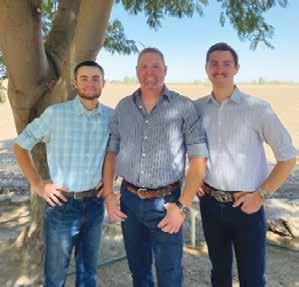
times were going to be coming. As if that wasn’t bad enough, the proliferation of almond orchards became the target of unfair public scrutiny over their water demand. Growers and investors kept on planting almonds and other permanent crops and drilling wells with reckless abandon in water-critical areas even in the face of impending SGMA regulations, which by the way, had been getting discussed and were coming down the pipe already since 2016 and prior. Now they’re facing water shortages and potentially having to remove orchards that never made them a dime to begin with. As a result of that we are now facing the likelihood of regulations coming that will require Environmental Impact Reports and CEQA land-use suitability reviews in order to obtain a permit to plant or even replant a permanent crop. It’s being talked about at the state level already.
Make no mistake…I take no pleasure in writing or reporting on these issues. They are the harsh reality of what we have done to ourselves within our own industry. Hopefully we as an entire ag industry will learn and grow and collectively become smarter, more patient, more responsible, and can begin to turn the tide of negative public perception and regulatory scrutiny towards us.
I wish everyone a joyous and safe Holiday Season! Here’s hoping for
weather, and relief from some of the economic difficulties we are facing.
Page 2 Merced County Farm News • December 17, 2022
arudich@mercedfarmbureau.org (209) 723-3001 646 S. Hwy 59 Merced, CA 95341 N O W O F F E R I N G SNotaryervices Alexxis Rudich C O N T A C T Commission # 2419135 Expiration October 1, 2026 D I S C O U N T E D M E M B E R R A T E S
Farm Bureau President Rejects Policy of Scarcity for Agriculture
By: CAFB
California Farm Bureau President Jamie Johansson opened the organization’s 104th Annual Meeting in Monterey Monday by calling on policymakers to build critical infrastructure to protect water resources and allow America’s most important agricultural sector to continue to thrive.
“The management of scarcity is failing,” Johansson told the gathering. “It’s time now to reimplement the management of bounty, which made
California great.”
California’s nearly 70,000 farms and ranches produce more than 400 commodities as the nation’s leading food producer. But a recent University of California, Merced, study estimates that an additional 750,000 acres of farmland in the state were fallowed this year due a third year of drought and cuts in state and federal water deliveries to agriculture.
Johansson stressed that such an outcome may have been avoided had California delivered on the $7.1 billion water infrastructure bond approved by state voters in 2014. He said the state
has failed to update its water system to meet the needs of California farms and communities as well as the challenges of a drier climate.
The consequences for agriculture are aggravated, Johansson said, by policies that stem from a mindset of working within the limits of scarcity— of adapting to a changing environment by paring down California’s agricultural potential.
Instead, Johansson said, new water storage and groundwater recharge projects can capture and store water in wet years for dry years and help protect and grow California’s food production.
“Change is inevitable,” Johansson said. “We understand change in agriculture. But what we struggle with is a state that doesn’t have a plan of how we make those changes based on principles.”
Johansson said, “We can continue in agriculture to make a difference, feed the world and more importantly prosper our communities.”
The California Farm Bureau works to protect family farms and ranches on behalf of nearly 29,000 members statewide and as part of a nationwide network of 5.3 million Farm Bureau members.
Merced County Farm Bureau’s Mission Statement

Merced County Farm Bureau is an independent, nongovernmental, grassroots organization that advocates for the men and women who provide food, fiber, and nursery products for our community, state, and nation.
Merced County Farm Bureau exists for the purpose of improving the ability of individuals engaged in production
agriculture to utilize California resources to produce food and fiber in the most profitable, efficient and responsible manner possible, guaranteeing our nation a domestic food supply.
Merced County Farm Bureau supports policies and legislation that promote and protect our Country’s number one industryagriculture for future generations and the security of our nation.
Page 3 Merced County Farm News • December 17, 2022
Merced County Farm News
Published monhtly by Merced County Farm Bureau

Phone (209) 723-3001
Fax (209) 722-3814 646 S. Hwy 59, Merced CA 95341
Email: dflake@mercedfarmbureau.org (USPS 339-500)
Entered as Second Class matter, Jan. 20, 1948 at the US Post Office in Merced, CA. Subscription is included in membership. Singles issues are 50 cents. Merced County Farm News is printed by Wesco Graphics, 410 E. Grant Line Road, Suite B, Tracy, CA 95376
POSTMASTER: Send address changes to Merced County Farm Bureau, P.O. Box 1232, Merced, CA 95341; telephone (209) 723-3001; FAX (209) 722-3814. Merced County Farm Bureau does not assume responsibility for statements by advertisers or for products advertised in Merced County Farm News, nor does Farm Bureau assume responsibility for statements or expressions of opinion other than in editorials or in articles showing authorship by an officer, director or employee of the Merced County Farm Bureau or its affiliates.

Merced County Farm Bureau
Staff
Breanne Vandenberg Executive Director
Lorraine Passadori Program Director
Denelle Flake
Farm News Editor/Project Specialist Alexxis Rudich
Project Assistant/ESJ Grower Relations
Board of Directors
Pres: Joe Sansoni 761-9284
1st VP: Alan Sano 559-905-1240
2nd VP: David Barroso 652-6437
Sec/Treas: Tim Lohman 988-3545
Past Pres: Eric Harcksen 620-1953 District 1
Sean Davis 769-1804
Joe Maiorino 564-6791 District 2
Bob Vandenberg 704-5568 District 3
Mike Martin ............................ 675-1907
Chad Perry 675-4474 District 4
Jean Okuye 756-2421
Galen Miyamoto 761-5366 District 5
Brent Chipponeri 652-3473
John Van Ruler .......................648-3877 District 6
Dante Migliazzo 769-9525
Bill Arnold. 761-0542 District 7
GIno Pedretti III 756-1612
Tom Roduner 769-9353 District 8
Julie Giampaoli 201-8434
Joe Scoto 761-0489
Directors at Large
Jim Johnston 564-7551
Jeff Marchini 769-9116
Bob Giampaoli ....................... 769-4973
Dan Dewees 658-4343
Louie Bandoni 761-0625
Michael Serrano 485-1935
Mariposa County Farm Bureau Staff
Danette Toso Executive Director
Board of Directors
Pres: Kelly Williams 376-2408
1st VP: Elnora George 376-2419
2nd VP: Carla Kelly 742-6862
Directors
Abel Lopez 376-2208
James Palmer 374-3470
Walter Palmer Jr 374-3470
Trevor Lee Smith 769-9969
Danette Toso 376-2304
Tony Toso 376-2304
Jordan Cory .................... 765-401-4078
CFBF Director - District 9
Andrew Genasci CFBF Field Representative
Page 4 Merced County Farm News • December 17, 2022
Jay Mahil
Pierce Hanning Merced County YF&R Chair
Stay Connected with MCFB Follow us on instagram @merced_farm_bureau Like us on Facebook Merced County
Bureau Join our mailing list by emailing info@mercedfarmbureau.org
Sarah Baskins YF&R State Committee - District 9
Farm
By: California Farm Bureau
December 2, 2022 -
Animal Health and Welfare
The Proposition 12 compliance deadline is quickly approaching on January 1, 2023. In and out-of- state distributors selling covered product (shell eggs, liquid eggs, veal meat, or pork meat) to an end-user in California need to register with CDFA's Animal Care Program by the first of the year. As Farm Bureau members might recall, California voters approved Proposition 12 in 2018. Proposition 12, or The Farm Animal Confinement Initiative, amended housing requirements for veal calves, breeding pigs and egg-laying hens. These amendments include cage-free design and minimum floor space for these housed animals. In order to regulate the new laws, the department has developed the new Animal Care Program within the Animal Health and Food Safety Services division at CDFA. This Program will serve animal agriculture producers and California consumers by promoting and protecting the welfare and care of animals in agriculture so Californians can have access to food that is sourced from humanely and sustainably raised animals. The new CA Code of Regulations pertaining to animal confinement can be found on this page, along with other program information.
On another note, the National Pork Producers Council and American Farm Bureau Federation have filed a case against Prop 12 that has reached the supreme court. Arguments were heard in October, but the court has not made a final ruling. Arguments against the implementation of Prop 12 have been made based on the disruption of interstate commerce and the requirements that out-of-state farmers must make in order to sell their products into California. The ruling will most likely be released next year, the deadline is June 2023. Farm Bureau continues to monitor these proceedings.
Forestry & Wildfire
This week, the Biden-Harris Administration announced $20.5 million in grants to help states or federally recognized tribes establish temporary bridge programs to protect
Farm Bureau at work
water resources during forest-related operations and to assist wood processing facility owners to establish, reopen, retrofit, or expand. The grants are focused on sawmills or other wood processing facilities that purchase and process byproducts from forest restoration activities in areas of severe fire risk and insect or disease infestation.
The funds, made available by President Biden’s Bipartisan Infrastructure Law, support the U.S. Department of Agriculture’s efforts to ensure tribes and historically marginalized or underserved communities receive equal access and opportunities to funding and programs, and to support community efforts vital to forest health. This funding opportunity also follows through on President Biden’s Executive Order directing USDA to scale up rural economic development and Agriculture Secretary Tom Vilsack’s direction to the Forest Service to find new ways to use byproducts from landscape improvement and wildfire mitigation projects to enhance carbon sequestration while creating jobs and economic opportunities. The $20.5 million being committing in fiscal year 2022 includes:
• $12.5 million targeted as financial assistance for owners of facilities that purchase and process byproducts from forest restoration projects including thinning, wildfire resilience activities and habitat management. Owners must identify how their work will use byproducts from areas of high or very high risk of severe wildfire or insect and disease infestation based on the high priority firesheds identified in the Forest Service 10-year Wildfire Crisis Strategy or by using the Wildfire Risk to Communities and National Insect and Disease Risk maps.
• $8 million is available to states and tribes to support the establishment of temporary bridge rental, loan or cost-share programs to protect water resources and reduce water quality degradation during forestrelated operations. The funding is to help states and tribes create a program that provides portable skidder bridges, bridge mats or other temporary water crossing structures to loggers and others working in forests areas. These bridges will
minimize damage from trucks and other equipment in forested areas, especially sensitive wetlands. • More information about these funding opportunities is available at the Forest Service website and on Grants.gov.
Insurance
This week, Insurance Commissioner Ricardo Lara ordered insurance companies to preserve residential insurance coverage from insurance non-renewal or cancellation for one year following Governor Gavin Newsom’s November 19 emergency declaration related to the Route Fire. The moratorium order includes 11 ZIP codes in Los Angeles and Kern counties, affecting approximately 52,343 residential fire insurance policies. Consumers can go to the Department of Insurance website to see if their ZIP code is included in the moratorium. Consumers should contact the Department of Insurance at 800-9274357 or via chat or email at insurance. ca.gov if they believe their insurance company is in violation of this law, or have additional claims-related questions.
Water
The Department of Water Resources (DWR) announced this week, an initial State Water Project (SWP) allocation of 5 percent of requested supplies for 2023. The SWP’s 33 lakes and reservoirs store 5.8 million acre feet of water at full capacity. The 662 miles of canals and pipelines provides water to 29 public water agencies that serve 27 million Californians and 755,000 irrigated acres.
Lake Oroville is the SWP’s largest reservoir at 3.5 million acre feet of water at full capacity. Currently, Lake Oroville is just 55 percent of average for this time of year. DWR will update allocation numbers monthly as snowpack and runoff information is assessed, with a final allocation typically determined in May or June. Last year the allocation was 5 percent with the initial allocation on December 1, 2021 of zero percent.
The Annual Water Right Fee invoices will be mailed on January 10, 2023 and payment is due by February 9, 2023. Payments for Annual Water Right Fees should be sent to the California Department of Tax and Fee Administration (CDTFA). Do not send payment to the State Water Resources Control Board. Online payments are accepted on the CDTFA Online Services webpage at: https://www.cdtfa. ca.gov/services/#Make-a-Payment. Additional information is available on the Water Right Fees webpage at: https://www.waterboards.ca.gov/ resources/fees/water_rights/ or email WaterRightsFees@waterboards.ca.gov if you have questions or need further assistance.
On September 20, 2022 the State Water Resources Control Board unanimously adopted a 7.2 percent increase in the Water Rights Fees schedule for Fiscal Year 2022-2023. Each year the water board adopts the fee schedules as emergency regulations because they are adopting after the fiscal year, July 1 to June 30 has begun. Once the state budget is adopted in June water board staff begin finalizing their fee schedules recommendation to the board.
From small farms to large commercial operations, the INSURICA Agriculture Experts have grown up in agricultural communities.
We’ve designed insurance programs to provide broad and flexible coverage for both your personal and business needs.

Page 5 Merced County Farm News • December 17, 2022
Murphy | 209.353.2700 | tmurphy@INSURICA.com | INSURICA.com
Tom
Gustine FFA Members Take on the 95th Annual FFA Convention and Expo
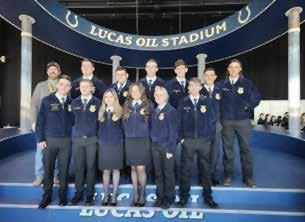 By: Kaitlin Dores, Gustine FFA Reporter
By: Kaitlin Dores, Gustine FFA Reporter
On October 26, 10 Gustine FFA members, Mr. Bafunno, and numerous parents hopped on a bus early in the morning and headed to the San Francisco Airport. They were more than excited to be heading to the 95th Annual National FFA Convention and Expo hosted in Indianapolis, Indiana. These members who had the privilege to attend did not just get this trip handed to them. They had to earn it; these members earned it by constantly giving back to our FFA chapter and community as Top Ten Freshmen or Top Five Members. They then had a connecting flight from the San Francisco airport to Houston, Texas. In Texas, they got a once-in-a-lifetime opportunity to meet the one and only Ryan Rash, an incredible livestock judge. He is known for his infamous glitter slap and being named the Showtimes Greatest Judge of All Time. After meeting such an incredible person in our industry, they hopped on their final flight and landed in Indianapolis, ready to take on the convention.
While ten members, Mr. Bafunno, and parents were hopping from flight to flight, we had two other members serving as National FFA Delegates. Austin Bell and Garret Gomes had the opportunity to fly out a couple of days beforehand and serve as national delegates. Becoming a National Delegate takes work; they had to go through an application process where over 100 California FFA members applied. After finding out they had made it to become national delegates, they had to go through training at the California FFA Center in Galt, California. They had a very important role as they attended meetings, approved bylaws, and reviewed the FFA constitution. These boys had a busy week on their specific assigned committee. Austin Bell was on the strengthening workforce connections committee. His committee's role was to develop a list of suggestions to be presented to the national board of directors that would give students a more direct path to a job in their desired field of agriculture. Garret Gomes was on the member experience committee, and being a part of that committee meant Garret and his other team members came up with suggestions on how to make FFA a more comfortable

environment for all members included within the organization. We are so proud of all the hard work and dedication they put forth to the National FFA organization.

As soon as our members, parents, and Mr. Bafunno settled into the hotel, to rest for a big day ahead. They loaded on a bus early Wednesday morning and drove north to the great Notre Dame University. While at the school, they had the opportunity to tour the campus, eat in the dining hall and even catch up with a 2022 Gustine High School graduate, Alondra Meza, who is now attending Notre Dame. The students had the opportunity to learn about the school's history and some of the most important

and fascinating architecture. Ashlyn Alamo shared, “I could've spent hours inside the beautiful detailed Cathedral. It was an amazing college that felt like a large community.”
Our members attended many sessions, leadership workshops, career shows, and college fairs throughout the week. Members attended the opening session, where they had the opportunity to hear from Tamika Catchings, a 4-time Olympic gold medalist, ten-time WNBA All-Star, and a WNBA Champion. Her speech was so empowering on how she overcame her challenges as a member of the deaf society; she never let her challenges stop her from facing her
dreams and making them a reality. After attending the first session and going to the career shows, they talked with different companies and met new people from all over the country.

Members also heard numerous retiring addresses from the 2021-2022 National FFA officer team. The one that specifically stuck out to Christina Moitozo was the national President's retiring address “He shared that no matter what your going through or have gone through, you are worthy of happiness. President Cole expressed he was happy to have everyone there because everyone has a place and belongs.”

Page 6 Merced County Farm News • December 17, 2022
Pictured: (Top Left to Right: Mr. Baffunno, Reese Carlucci, Antonio Hermosillo, Michael Salsa, Jake Campbell, Austin Bell, and Austin Etheridge (Bottom Left to Right): Garret Gomes, Grant Hazan, Kaitlin Dores, Christina Moitozo, Ashlyn Alamo, and Blake Vaz
Pictured from left to right is National Delegate Austin Bell and Garret Gomes.
the former Florence Cardoza of Merced in 1942.
By: Gillian Brassil, The Modesto Bee
December 2, 2022 - A Republican farmer and businessman defeated a Democratic Assemblyman in one of the nation’s closest congressional elections. Modesto’s John Duarte squeezed past Adam Gray, D-Merced, in California’s 13th Congressional District, the Associated Press projected on Friday night. Just moments earlier, Gray said he conceded to Duarte in the left-leaning Central Valley district.
Duarte, 56, will join a slim Republican majority in the U.S. House of Representatives. As of Friday night, the GOP was projected to claim 221 seats. Democrats were expected to take 213. There is just one other uncalled House race; a Republican is leading. The Duarte Nursery co-founder had 50.2% of the votes with about 99% counted when the AP called the race. Duarte, whose team had been prepared to declare his win on Monday, was fourtenths of a point — 565 votes — ahead of Gray, after Fresno County updated its ballot counts.
After the war, and during his life as a sweet potato farmer, he served as President of the California Sweet Potato Council, and US Sweet Potato Council, where he was a Director for over 20 years. He was the first California farmer to attend the National Sweet Potato Convention, among other industry firsts. Joe served as President of the Merced County Farm Bureau, and was on the Board of Directors of the Nisei Farmers League. He formed the California Sweet Potato Growers Co-op in Livingston, along with several other local growers, which is celebrating its 50th anniversary this year.
His interests and community involvement were very diversefrom serving as a founding member of the Livingston Medical Group, to past-President of Livingston Rotary, to being
known as the “Voice of Livingston.” From 1946 to 1996, he announced all the Livingston High School football games, lending his strong voice to the community by also announcing everything in Livingston from parades to radio programs. He served on the Livingston Elementary School Board and the Merced County Recreation Commission for many years. Joe’s acting skills even benefited the Livingston Little Theater Group, where he starred in several productions, most notably as Elwood P. Dowd in “Harvey”.
“Voters have chosen me to be their congressman and I am honored to be able to go in and fight for the 13th district,” Duarte told The Bee on Monday at a hotel near Capitol Hill, where the second round of New Member Orientation was this week. The back-and-forth race began with Gray, 45, ahead on election night. Duarte took over for almost a week. Then Gray led briefly. Duarte emerged on top and held his place through now.
JOHN DUARTE
Duarte stressed his desire to increase water access for farmers and Valley families, drill more American oil and tackle inflation with more scrutiny over government spending. Coming from a family of Central Valley farmers, Duarte started his plant-nursery business in Hughson with his brother. From kitchentable businessman to congressional campaign, the Republican said his family — parents, brother, wife and four kids — helped him throughout his pursuits.
Previously, Duarte rallied farmers


and conservatives around him while fighting a lawsuit surrounding environmental regulations. A judge ruled in 2016 that he violated a provision of the Clean Water Act known as “Waters of the United States” by plowing over protected wetlands on his property. The California Republican said he had planted winter wheat on the Tehama County field just as previous property owners had done. He and his allies said that it was a case of the government interfering with agriculture. Government officials said that the field had not been plowed in more than two decades and that Duarte needed a permit before ripping up its seasonal wetlands that served as a habitat for plants and animals. He said he settled before going to a trial over penalties in 2017 to avoid expenses that would jeopardize his business and workers. Duarte said he hopes his perspective as one of a few farmers and businessmen in Congress leads to more support for Central Valley needs. “A lot of that simply involves appreciating what it takes to run a business, to make a payroll,” Duarte said, “and knowing what it takes to produce a crop, to own a family-farming business, to expand that business, to know when to take risks and to weather through some of the risks.” Both Duarte and Gray have protested water policy in Sacramento. Gray has represented Merced, where he was born and raised, in the Assembly since 2012. A self-proclaimed “radical centrist,” the moderate Democrat has championed water access and public safety, such as through securing funds for Merced’s VIPER program to combat gang violence. Gray teaches at UC Merced, the university where he pushed for the establishment of a medical school program. “Whether elected or not, I will never stop fighting for the Valley,” Gray said in a statement about his concession.

His love of baseball began at an early age and became a life-long interest that manifested itself into a devotion to the sport for over eighty years. He organized the first kid’s hardball team in Merced County in the early 50’s. He was particularly fond of American Legion Baseball, serving as a coach, sponsor, announcer
and booster for over fifty years. This led to his being appointed the third Area Commissioner of Baseball. All of these years of being involved in baseball in Livingston culminated in the community baseball field being renamed the “Joe F. Alvernaz Baseball Field,” something he was so proud of.
great grandchildren.
By tenths, Republican John Duarte beats Democrat Adam Gray in close congressional race
His light on earth has dimmed, but heaven is brighter as he has joined Florence, the true love of his life.
A CLOSE ELECTION
Formed through the once-a-decade redistricting process, California’s 13th Congressional District runs from Lathrop past Coalinga in a purple stretch of Central Valley farmland. Voters there would have backed President Joe Biden by 11 percentage points in the 2020
presidential election. There are more registered Democrats than Republicans. The race in the 13th went from leaning toward Democrats to being a toss-up to favoring Republicans in the eyes of many independent analysts. They all agreed that the election, one of the last ones to be called, would be close. While a predicted nationwide “red wave” never came into fruition in the 2022 midterms, disdain for Democrats in Sacramento and Washington D.C. had a lot of San Joaquin Valley voters supporting Republicans, per interviews prior to the election. Historical voting trends pointed to issues Democrats would face there. In other recently-called California races, Assemblyman Kevin Kiley, R-Rocklin, defeated Democratic Dr. Kermit Jones
So long to our Dad, coach, neighbor and everyone’s friend. He will be deeply and painfully missed, yet celebrated, honored and never forgotten.
Joe was predeceased by his parents, Joe and Mabel Alvernaz, brothers, Arthur and John Alvernaz, and sister, Mary Geyer. He was also predeceased by his oldest son, Joey Alvernaz, in 1980 and by his wife of 64 years, Florence, in 2007.
He is survived by five children, Judy Blevins, James (Colette) Alvernaz, and Benjamin (Debbie) Alvernaz of Livingston; Cecelia (James) Simon of San Diego, and Susan (Randall) Wilson of Mariposa, a sister, Cecelia Luker of Atwater, 17 grandchildren and 13
In lieu of flowers, the family requests that donations may be made to Grace Nursing Home in Livingston or to the Joe F. Alvernaz Memorial Fund to benefit youth baseball in Livingston.
Sweet Potato Joe was the Farm Bureau President from 1983-1986 and hired long-time staff member Lorraine Passadori when she showed up in her clown costume for the interview.
in the 3rd Congressional District. Rep. David Valadao, R-Hanford, beat challenger Assemblyman Rudy Salas, D-Bakersfield, in the district south of the 13th. Duarte said he will start his term by networking with a lot of California congressmen like Valadao, another farmer-businessman who “represents a very similar district with very similar bipartisan kind of needs as what the 13th is.” He hopes to work with committees on agriculture and natural resources to bolster American production of such goods, saying “until we have abundance, we’re not going to have affordability.” “That’s not a partisan issue,” Duarte said. “That’s just a reality that American families are running up against right now.”
Agriculture lost a strong advocate that will truly be missed. We will continue to keep his family in our thoughts and prayers.
Page 7 Merced County Farm News • December 17, 2022 Merced county Far M n ews s aturday, nove M ber 16, 2013, page 12
Sweet Potato Joe from page 1 Pazin & Myers, Inc. 129 West 15th Street Merced, Ca 95340 Serving Merced and Mariposa Counties for over 35 years! (209)725-2050 Meeting all of your residential, farming, commercial, and retail needs... GASOLINE - DIESEL - QUALITY LUBRICANTS



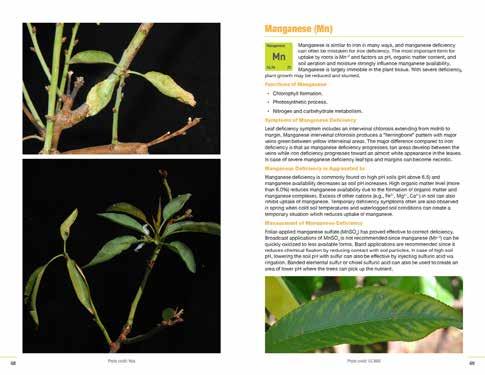



Page 8 Merced County Farm News • December 17, 2022 dentification Cards Almond Disease and Nutrient Deficiency Pest ID Weed ID Now Available! Email fieldoutreach@almondboard.com to order your copy of these Almond Specific Identification Cards:
Merced County Fair Announces Richard Sandoval as New Deputy Manager
By: Merced County Fair
MERCED, CALIFORNIA, December 5, 2022 – The Merced County Fair is excited to announce Richard Sandoval as the new Deputy Manager for the Merced County Fair. Richard has an extensive history in the fair industry and the Merced community. He first started in the fair industry in 2002, when he joined the Merced County Fair team where he worked until 2018, managing fair-time operations and admissions personnel. In 2010, he joined the Madera District Fair team overseeing their fair-time operations before being named their
Deputy Manager in 2015. Prior to joining the fair industry, Richard was in the insurance and banking industry in Merced.
“We are thrilled to welcome Richard Sandoval back to our Merced County Fair team, this time as our new Deputy Manager,” said Teresa Burrola, CEO of the Merced County Fair. “Richard is an exceptional leader who has a passion for our fair and our community. I look forward to working with him again to help lead our fair into the future.”
In his role with the Merced County Fair, Richard will work alongside Teresa Burrola to produce the annual fair, build upon its year-round events and enhance community connections.
“The Merced County Fair is a staple for the community. It brings people together and creates memories – whether that’s participating in the fair as an exhibitor or attending with friends and family. That extends to events throughout the year. The fairgrounds are a true gathering spot for the community. I look forward to working with the incredible team here at the Merced County Fair, led by Teresa Burrola, to continue to improve the fair for our community and our future generations of fairgoers,” said Richard Sandoval, Deputy Manager of the Merced County Fair.
Growing up in Merced, Richard has many fond memories of the Merced
County Fair, including watching the parade that used to take place down Martin Luther King Jr. Way to the fair gate, officially kicking off opening day. That love of the Merced County Fair also extends to his family, wife Sandra, three daughters and two new grandchildren. “It excites me to be back and have my hands in producing the best fair possible to create memories for our community, including my family who is now in its third generation of fairgoers,” said Richard.
The 2023 Merced County Fair will run June 7 – 11. More fair details will be announced in the upcoming months and will be posted to the website at www. MercedCountyFair.com.

Page 9 Merced County Farm News • December 17, 2022
20% OFF allpurchases!equipment Good thru’ 12/30/22 Get the equipment you need at a great year-end price! Will you use it or lose it? We all know the drill. Spend your allocated budget or lose it! What better way to spend those funds than to upgrade, replace or get that new cleaning, sanitizing & disinfecting equipment or water treatment system you need? FORMERLY HOTSY PACIFIC 6 Months Same As Cash on all Hotsy Floor Care Equipment! *Offer through 12/30/22. Restrictions apply. After six months, purchase and equipment for the cash price or start a payment program. Can not be combined with any other offers. NORTHERN CALIFORNIA BAY AREA | SANTA ROSA | MODESTO 209.578.3925 Equipment | Sales | Service PacificBayEquipment.com Premier Provider of Innovative Cleaning, Sanitizing, Disinfecting & Water Treatment Solutions since 1976.
Thompson elected House Ag Committee chair
By: Noah Wicks, AgriPulse

Rep. Glenn Thompson, R-Pa., has been elected by the House Republican Steering Committee as the next chairman of the House Agriculture Committee.
Thompson, a longtime member of the committee and its current ranking member, will step into the role the same year the farm bill is scheduled to be drafted. He said in a statement that he
was "honored" by the appointment.
"The political landscape in Washington may be fractured, but as chairman, I will prioritize the needs of our producers and rural communities — the backbone of this country," Thompson said in a statement. "We will keep our foot on the gas to deliver principled solutions, robust oversight, and a farm bill that is responsive to the needs of the country’s farmers, ranchers, and foresters.”
The committee is currently chaired
by Rep. David Scott, D-Ga. In a statement Thursday, Scott said "it has been the honor of a lifetime" to serve as the chairman and wished Thompson "the best" in the new role.
"I am encouraged by the bipartisan work we have accomplished together, particularly around our shared interest in broadband and access to USDA programs for our new and small producers," Scott said. "Heading into the 2023 Farm Bill, I am hopeful and prayerful that the collegial spirit
will continue and that the Agriculture Committee will be able to deliver a farm bill with strong Republican and Democratic bipartisan support."
Thompson will be the first Pennsylvanian to chair the committee since Democrat John L. Dawson, who served in the post from 18531855, according to Wikipedia. The committee's first chairman was also from Pennsylvania; Thomas Forrest (1820-21) was a member of the Federalist Party
Juan Alanis takes oath to join state Assembly
By: The Ceres Courier
Newly elected state Assemblyman Juan Alanis (R-Modesto) wasted no time after his Monday swearing-in ceremony to announce that he’ll start his work for the constituents of the 22nd Assembly District by introducing the “California Promise” legislative package, which focuses on passing legislation that puts hardworking Californians first.
Alanis was elected Nov. 8 over Democrat Jessica Self by a margin of 58.1 percent to 41.9 percent. He had to resign from the Stanislaus County
Sheriff’s Department to assume his new role.
His district includes Ceres as well as Keyes, Modesto, Turlock, Empire, Denair, Patterson, Gustine, Newman, Hilmar, Ballico, Snelling, Grayson, Crows Landing, Diablo Grande and Stevinson.
“Californians pay the highest income taxes in the nation, leaving far too many families struggling,” said Alanis. “I will fight for real policy solutions to ensure that every Californian can afford to live in the golden state. It is crucial, as legislators, to help families do more than
just make ends meet and we can start by lowering tax rates for middle- and lowincome taxpayers. We also need more water storage, and I will be introducing legislation that will put funding in place to ensure that we can build sufficient water infrastructure for all Californians, including my constituents in the Central Valley.”
The new assemblyman said he is dedicated to relieving the financial burden many Valley families are feeling by introducing legislation that will cut unnecessary taxes for Californians by lowering the income tax rates for the
middle and lower class. This would allow taxpayers to keep more of their wages.
As part of the California Promise, Alanis will also introduce legislation that will place guaranteed funding for critical investments needed to ensure there is available water infrastructure and sufficient healthy forest and wildfire prevention to protect California. If passed, the proposal will help protect environmental health of forest lands, which will combat wildfire risk and spur workforce development in rural areas of the state.
Page 10 Merced County Farm News • December 17, 2022
Merced County Farm Bureau Heritage Members






Platinum Heritage Members


Gold Heritage Members

Page 11 Merced County Farm News • December 17, 2022
Grimbleby Coleman CPAs Holt Ag Solutions Minturn Nut Company Turlock Irrigation District Valley Pacific Petroleum Services Inc.
Merced County Young Farmers & Ranchers Update

 By: Alexxis Rudich, YF&R Secretary
By: Alexxis Rudich, YF&R Secretary
The Merced County Young Farmers and Ranchers (YF&R) group is excited to announce our 2022-2023 Executive Team:
Chair- Pierce Hanning
Vice Chair- Javier Garcia Vice Chair of Membership- Gabe Rudich
Secretary/Social Media Chair- Alexxis Rudich
Treasurer/Fundraising Chair- Sariah Avila
Social Co-Chairs- Denelle Flake and Karyn Hanning Director of Harvest for All- Andrew Ornelas
YF&R held an October social at Cotton Tree Ranch in Dos Palos. The
group worked together to navigate the corn maze and managed to not lose any members along the way. In November we hosted a Thanksgiving potluck. We had two new members join us and everyone enjoyed the delicious food. In December, we were able to partner with Fluetsch and Busby Insurance (F&B) to adopt families for the Season of Giving hosted by Merced County Human Services Agency. With F&B we were able to adopt two families and three young adults. We purchased gifts for each person on our list and provided non-perishable food items as well.
Five of our members attended the California YF&R conference that took place in Monterey earlier this month. Our members participated in workshops, networking, tours, and more! We even got to hear from Ashley Machado, a

Page 12 Merced County Farm News • December 17, 2022
Merced County Farm Bureau member, who was the keynote speaker.
planned for next year! Happy New Year from Merced County Young Farmers
Alvarado-Gil Talks About Defying Odds To Win Senate Seat
By: BJ Hansen & Tracey Petersen, My Motherload
November 28, 2022 - Jackson, CA — When Marie Alvarado Gil entered the June Primary election, with little name recognition, the Democrat was a longshot to win the California Senate District Four seat.
The district covers all or parts of 13 counties, and, as Alvarado Gil points out, is geographically about the size of Delaware. The region leans conservative, having been represented in recent years by Republicans Andreas Borgeas, Tom Berryhill and Dave Cogdill.
California uses an open primary system to elect state and federal lawmakers, meaning the top two votegetters in the June primary, regardless of party, move on to the November General Election.
Six Republicans ran for the seat, including former Congressman George Radanovich, Central Valley businessman
Jeff McKay, and former El Dorado County Superior Court Judge Steven Bailey.
Alvarado Gil, an educator, who lives in Jackson, was one of only two Democrats in the primary, along with Tim Robertson.
Vote-wise, Republicans fared far better in June election, with GOP candidates receiving 130,886 votes to 90,142 for Democrats. However, the Republicans split the vote, and none of the six moved on to the next round, as the two Democrats ended up with the highest percentage, Robertson with 22.1-percent and Alvarado-Gil with 18.7-percent. Radanovich was a close third.
Then in the General Election, in some ways, she played second fiddle in her own party. Robertson received the endorsement of the California Democratic Party, most leading labor organizations, and a long list of other backers. Alvarado Gil, meanwhile, was endorsed by nearly a dozen sitting
Democratic lawmakers, as well as some Republicans, like former Assemblyman Bill Berryhill and Former Assembly GOP leader Kristin Olsen. She also garnered the backing of business groups like the California Chamber of Commerce.
After running a strong General Election campaign, she defeated Robertson, 52.9-percent to 47.2-percent.
Asked for her reaction, she says, “It certainly was an upset for some, but not for us, and our supporters. For me, it was how we ran our campaign, which I felt had to be authentic. It wasn’t about politics, and it was about people. Being in people’s living rooms, and hearing their concerns, is what the campaign was about. I am really honored (to be elected).”
Her first goal is to meet with city and county leaders throughout the district to learn about issues they are facing, and hearing possible solutions. Adding, “I can’t lead from Sacramento if I don’t know what is right in front
of us in the communities that I serve. That is what is important to me, and where I am going to be dedicating the first part of my service. Over and over again, I heard during the campaign about how disconnected Sacramento is from the people. Our elected officials in Sacramento continuously put in one-size fits all solutions that don’t work for the Mother Lode.”
She notes that some of the major issues she will be focusing on are wildfire prevention, emergency evacuation routes, fire insurance challenges, and needed broadband internet expansion.
Newly elected lawmakers are scheduled to take the oath of office on December 5 at the capitol. Her term will run four years.
Her final message to constituents is, “Please, invite me to your community events and functions. I would love to be there as a patron and supporter of all the hard work you are doing in the community.”
USDA’s agricultural census is live. What Central Valley farmers should know in California
By: Melissa Montalvo, The Modesto Bee
The time has come for Central Valley farmers to complete the federal government’s Census of Agriculture — a count that could reveal important insights into the impact of California’s drought on the industry.
On Tuesday, the U.S. Department of Agriculture announced the 2022 ag census, a count of the nation’s farm operations that takes place every five years by the National Agricultural Statistics Service. “This is a chance for farmers to show the importance of what they do,” Gary Keough, Pacific region director and California state statistician with the USDA, said in an interview with The Bee/Fresnoland. According to a USDA news release, “the ag census
is the nation’s only comprehensive and impartial agriculture data for every state, county, and territory.” The census collects detailed information on land use and ownership, producer characteristics, production practices, income, expenditures, labor, and other topics.
The census is especially important for California agriculture in light of the state’s ongoing drought. California’s current drought from 2020 to 2022 is now the driest three-year period on record and has taken a toll on California farmers. “This will probably be the best chance to record the amount of fallow land by county,” Keough said.
He also said changes in cropland use — especially changes in the acreage of fallow land, fruit, and nut trees— are of “particular interest here in California.” “Given our water and temperature situation this last year,” he
said, “(this information) is going to be monitored closely, particularly at the county level.” For the first time since the ag census was conducted in 1840, the USDA will also collect information about industrial hemp production. The census also has questions on precision agricultural practices, said Keough, such as operations that involve GPS use or drone use for scouting and livestock handling. There are also new questions related to hair sheep as well as updates to internet access questions.
WHO SHOULD COMPLETE THE CENSUS?
The USDA is encouraging farm operations — both urban and rural — to complete the ag census. “I strongly encourage all farmers, no matter how large or small their operation, to promptly complete and return their ag
census,” USDA Agriculture Secretary Tom Vilsack said in a news release. Operations that produce and sell (or normally would have sold) $1,000 or more of agricultural products in 2022 should complete the census.
“We’re encouraging more producers to report online if they have the internet access, it’s usually a little quicker,” said Keough. Data will be collected through Feb. 6, 2023. Keough said the tentative release of the census data will be in the spring of 2024. The USDA mailed unique survey codes to all known agriculture producers across the country. These survey codes are to be used to complete the 2022 Census of Agriculture at agcounts.usda.gov. Customer support is available weekdays 6 a.m. to 3 p.m. Pacific Time for anyone who needs support filling out the survey at 888-424-7828.
Page 13 Merced County Farm News • December 17, 2022




Page 14 Merced County Farm News • December 17, 2022
Electric tractors that require no driver make debut at plant. What keeps them safe?
By: John Holland, The Modesto Bee
The world’s first all-electric farm tractors with remote controls rolled out Thursday at a Livermore company. Monarch Tractor made that boast at a gathering for about 250 industry colleagues and the media. The rigs pollute far less than diesel models and will protect farmworkers from hazards, co-founder Carlo Mondavi said. “Today, we’re launching a revolutionary technology that is going to change the way we farm, make farming more profitable, make us farmers more independent, all the while protecting our planet’s biodiversity ...,” he told the crowd. Several states allow tractors to operate without drivers. California could have joined them at a June meeting of the Occupational Safety and Health Standards Board, but it opted for more research. Autonomous tractors can till soil, spray pesticides, pull weeds and do other tasks. Monarch leaders say they will reduce repetitive tasks for
workers and the risk of injuries, heat stress and poisoning. The tractors have sensors that detect obstacles and an emergency shutoff switch within reach of people nearby. Worker advocates told the state board that more study would ensure that self-driving tractors truly are safe. They also were concerned the technology would put people out of work. The board has not announced when it might make a decision. Monarch has had a state permit allowing experimental use of the tractors at one vineyard in the Livermore Valley and another in the Napa Valley.
$78,000 MINUS SUBSIDIES
The new tractors have a sticker price of about $78,000, more than diesel, but state subsidies make them cheaper for farmers, Mondavi told The Modesto Bee. He added that the maintenance cost is much less than diesel. Mondavi is part of the fourth generation of one of California’s leading wine families. The other co-founders have Silicon Valley
tech backgrounds. The first six tractors will be used in the To Kalon Vineyard in the Napa Valley. It is owned by Constellation Brands, one of the largest players in the wine industry. The tractors have climate-friendly features that make them worthwhile even without the self-driving feature being allowed yet, said Robert Hanson, president of Constellation wine and spirits. He received six sets of keys while on stage with Monarch leaders. Hanson told The Bee the electric fleet eventually will expand to the company’s vineyards in the San Joaquin Valley and elsewhere. Constellation still has Valley holdings even after the sale of numerous brands to E.&J. Gallo Winery of Modesto last year.
MANUFACTURING WILL MOVE EAST
Monarch employs about 300 people at the plant, which is off Las Positas Road in northeast Livermore. It will produce 60 of the tractors before
manufacturing shifts to Mahoning Valley, Ohio. Research and development will remain in Livermore. Monarch did not invent the self-driving tractor, but it does claim to have the first with all-electric power rather than a hybrid with diesel. The unveiling took place in a tent just outside the factory building, letting the audience escape the rain. Electric tractors are part of state and federal goals to shift vehicles away from the carbon emissions that are harming the planet. The effort involves cars, trucks, locomotives, aircraft and more. The Monarch brand reflects its interest in the endangered butterflies by that name. Mondavi talked of aiding them by reducing pesticide use and providing diverse plants amid a changing climate. The speakers also included Alice Waters, founder of the renowned Chez Panisse restaurant in Berkeley. She has long advocated for local, organic food at restaurants, school cafeterias and other places. “Thank you for inventing this wonderful tractor that will help our farmers and our butterflies,” Waters said.
Goat Herder is California Farm Bureau Farm Dog Winner
By: California Farm Bureau
Rip, a 2-year-old border collie who herds goats on a Bakersfield ranch, has earned the $1,000 Grand Prize in the third annual California Farm Bureau Farm Dog Contest. The award was announced today during the 104th California Farm Bureau Annual Meeting.
Open to Farm Bureau members, with support from Nationwide, the Farm Dog Contest asked entrants to submit photos and answer a few brief questions about their dog.
Romi Poncetta runs Maggenti Show Goats, raising Boer goats to sell to 4-H and FFA youths across the country, who will then prepare them for livestock shows.
Rip helps Poncetta every day in moving the goats from the pasture into pens, where the goats can get any needed hands-on care and pose for pictures used for marketing. Through it all, “he’s right there with me and he keeps bringing the next goat in.”
But Rip is much more than just a working dog. “Rip is truly a blessing and a one-of-a-kind dog I wish everyone
could have,” Poncetta said. “He is one of the best things that has happened to myself and my family.”
The First Runner-up honor, and a $500 prize, went to Alba, a Lagotto Romagnolo, who finds and digs up truffles at Sky Saddle Orchards in Santa Rosa, owned by Karen Passafaro. In her spare time, Alba serves as a therapy dog for assisted-living homes.
Second Runner-up, and $250, was awarded to Ray, an Australian shepherd who serves as a watch dog and cow herder on Elkhorn Ranch, a cow-calf operation in north Monterey
County. Ray also has been a cherished companion to ranch owner Robert Stephens, who was recently widowed.
Third Runner-up, and $100, went to border collie Dot, who started as a star pupil at the Border Collie Training Center in Modoc County. She helps owner Geri Byrne herd about 250 sheep that Byrne uses to train the dogs.
The California Farm Bureau works to protect family farms and ranches on behalf of nearly 29,000 members statewide and as part of a nationwide network of 5.3 million Farm Bureau members.
Page 15 Merced County Farm News • December 17, 2022
State Water Project initial allocations set for just 5 percent
By: California Water News Daily
December 5, 2022 - The Department of Water Resources (DWR) on Dec. 1 announced an initial State Water Project (SWP) allocation of 5 percent of requested supplies for 2023. The SWP provides water to 29 public water agencies that serve 27 million Californians.
As the state prepares for a fourth dry year and continued extreme drought conditions in California, DWR will also assess requests for additional water that may be necessary for health and safety including minimum domestic, sanitation, and fire suppression needs.
“This early in California’s traditional wet season, water allocations are typically low due to uncertainty in hydrologic forecasting. But the degree to which hotter and drier conditions are reducing runoff into rivers, streams and reservoirs means we have to be prepared for all possible outcomes,” said DWR
Director Karla Nemeth.
Lake Oroville, the State Water Project’s largest reservoir, ended Water Year 2022 about 400,000 acre-feet higher than the previous year, which was the lowest storage level on record. However, Oroville remains just 55 percent of average for this time of year.
DWR is conserving existing storage in Lake Oroville in the event dry conditions continue. The initial 5 percent allocation would be met by flows from winter storms entering the Delta as well as stored water in San Luis Reservoir. If storage levels in Lake Oroville improve as the wet season progresses, DWR will consider increasing the allocation if warranted. DWR is also working closely with senior water rights holders on the Feather River downstream of Lake Oroville to monitor conditions and assess water supply availability should dry weather persist.
“We are in the dawn of a new era of State Water Project management as
a changing climate disrupts the timing of California’s hydrology, and hotter and drier conditions absorb more water into the atmosphere and ground. We all need to adapt and redouble our efforts to conserve this precious resource,” said Nemeth.
California traditionally receives half its rain and snow by the end of January. Water managers will reassess conditions monthly throughout the winter and spring. Starting in February, the assessments will incorporate snowpack data and runoff forecasts. For the second year in a row, DWR is broadening the deployment of more sophisticated technologies, such as aerial snow surveys, that can collect snow measurements farther upslope of the Sierra Nevada. This will improve forecasts of spring runoff into reservoirs.
Water managers will be monitoring how the wet season develops and whether further actions may be necessary later in the winter. If dry
conditions persist, DWR may also pursue submission of a Temporary Urgency Change Petition (TUCP) and re-installation of the West False River Emergency Drought Salinity Barrier in the Sacramento-San Joaquin Delta.
Each year, DWR provides the initial State Water Project allocation by December 1 based on available water storage, projected water supply, and water demands. Allocations are updated monthly as snowpack and runoff information is assessed, with a final allocation typically determined in May or June.
The lowest initial SWP allocation was zero percent on December 1, 2021, with limited water designated only for any unmet human health the safety needs. Last year’s final allocation was 5 percent plus unmet health and safety needs. Four of the 29 State Water Contractors ultimately requested and received additional health and safety water supply.
Is Newsom’s gas profits penalty really a tax?
By: Dan Walters, CalMatters
December 7, 2022 - When Gov. Gavin Newsom launched his crusade against what he called blatant price-gouging on gasoline by oil refiners, he called for taxes on excess profits.
At the time, gas prices had soared to more than $6 a gallon in some locales, a couple of dollars higher than those in other states, and Californians’ pain at the pump symbolized the soaring inflation that was ravaging household budgets.
However, when Newsom finally outlined his proposal this week, the tax approach had been abandoned and instead, he said he wants petroleum companies to be docked civil penalties by the state Energy Commission if they exceed designated profit margins.
“California’s price gouging penalty is simple — either Big Oil reins in the profits and prices, or they’ll pay a penalty,” Newsom said in a statement. “Big Oil has been lying and gouging Californians to line their own pockets
long enough. I look forward to the work ahead with our partners in the Legislature to get this done.”
Later, he told reporters, “I believe in free enterprise, I just don’t believe in greed. These guys have been gaming the system for decades. They’ve been taking advantage of you for decades. And it’s got to end.”
Why the change from taxes to civil penalties?
It has to do with the state constitution, which requires any tax to be passed by two-thirds majorities in both houses of the Legislature. Newsom is betting that the civil penalties that he proposes would be exempt from that requirement and thus need only simple legislative vote majorities to become law.
In other words, he’s not certain that despite overwhelming Democratic legislative majorities he could muster a two-thirds vote for a profits tax, due to a general reluctance among politicians to impose new taxes and the oil industry’s
vigorous courting of support, aided by its influential unions.
The industry had already signaled that it would vigorously oppose a profits tax by characterizing it as something that would raise pump prices even higher. But what about civil penalties?
The industry immediately characterized them as taxes in sheep’s clothing.
“A fee imposed on the industry as a commodity going to the government, that is going to look and act like a tax,” Kevin Slagle, spokesperson for the Western States Petroleum Association, said. “We know windfall taxes have been tried nationally and don’t work. What we need to do is focus on better public policy.”
So we know how the political battleground is being staked out, but what’s the underlying legal situation?
When Newsom’s proposal was formally introduced as Senate Bill 2X on Monday, the Legislature’s legal counsel marked it as a non-tax
measure requiring only simple majority votes. Ultimately, however, whether the proposed civil penalties qualify for that designation depends on the interpretation of an exemption allowed in the constitution’s Article XIII A, Section 3.
It says, “A fine, penalty, or other monetary charge imposed by the judicial branch of government or the state, as a result of a violation of law” is not a tax. In other words, Newsom would put gasoline profit penalties in the same exempt category as traffic tickets for speeding.
We don’t know as yet what Newsom’s legislation would set as a profit speed limit or what the penalties would be for exceeding it. SB 2X leaves those numbers blank, to be filled in later as the measure makes its way through the legislative process next year.
Were it to become law, however, we would most likely see a prolonged legal battle over whether, indeed, excess profit penalties are not taxes.
Page 16 Merced County Farm News • December 17, 2022
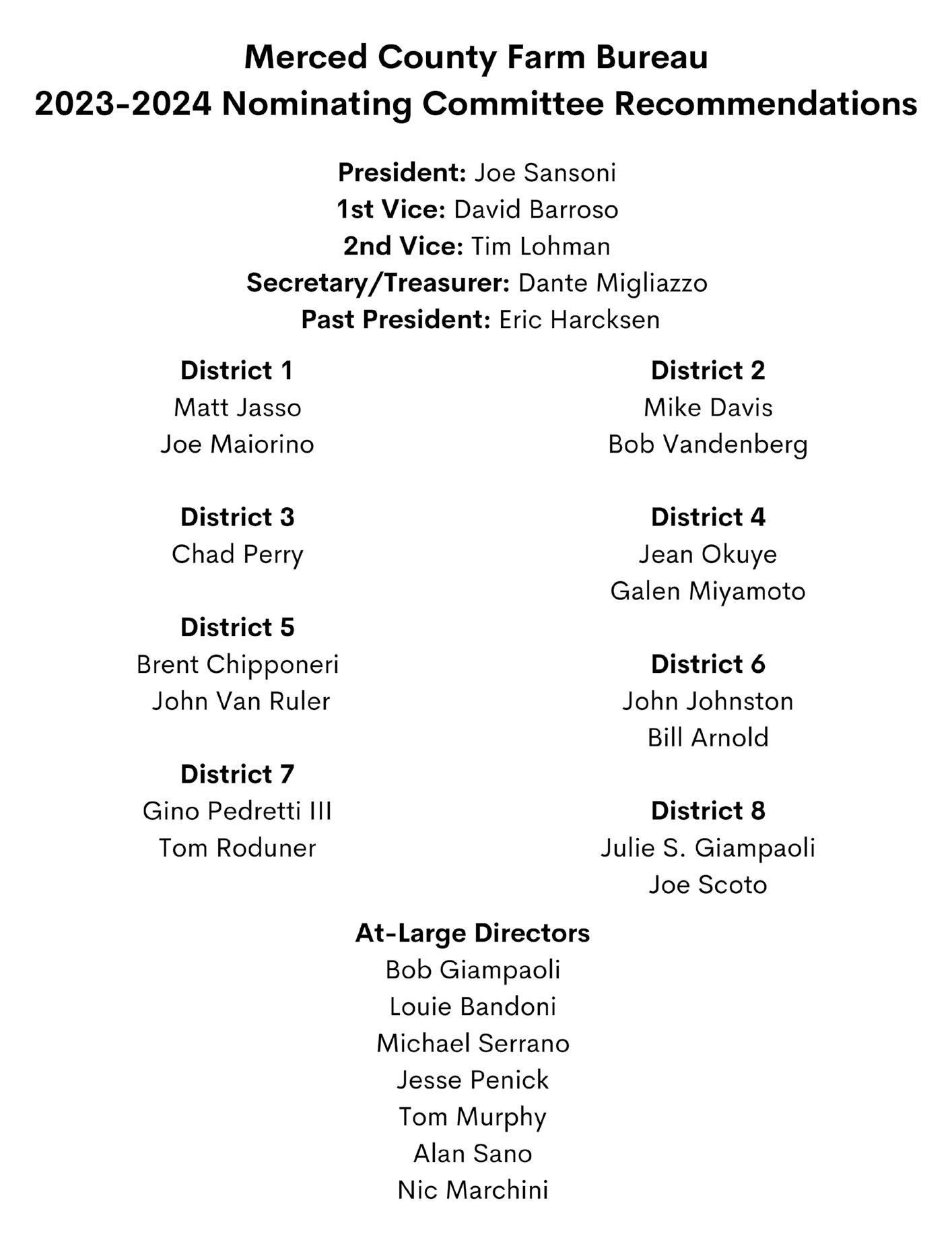
Page 17 Merced County Farm News • December 17, 2022
Agriculture in the Classroom program honors ‘Outstanding Educator’
By: California Farm Bureau
Amiddle school teacher in Los Angeles who introduces urban students to farming and ranching experiences has been honored with the “Outstanding Educator Award” presented by the California Foundation for Agriculture in the Classroom.
Carrie Lawson Robertson received the award at the 104th California Farm Bureau Annual Meeting in Monterey.
Robertson teaches students about agriculture at a 2-acre farm at Paul Revere Charter Middle School. On the property that backs up to the Santa Monica Mountains and Los Angeles’ bustling Sunset Boulevard, she directs
a “land lab” that includes a traditional classroom along with a vineyard, orchard, raised farm beds, native gardens and a hiking trail.
The students produce grapes, stone fruit, alfalfa, pumpkins, kales, tomatoes, artichokes and herbs. They also look after a pot belly pig named Daisy as well as several goats, chickens, guinea pigs, rabbits and chinchillas. The immersive agricultural experience allows kids from the city to connect with the food they eat and learn about farming and the natural environment.
“Carrie is a true advocate for agricultural education,” said Judy Culbertson, executive director of the California Foundation for Agriculture in the Classroom. “Her dedication and
creativity in her classroom on Sunset Boulevard have made a positive, lifelong impact on her students, and the enthusiasm she has for incorporating agriculture into the classroom is undeniable. Carrie understands the critical importance of agriculture and she works to instill this appreciation in her students.”
Robertson’s father and grandfather were cattle ranchers on the outskirts of Los Angeles. She said her experiences in straddling two worlds—agriculture and urban life—inspired her teaching philosophy of helping students find a personal connection to food, land and agriculture. She also helps them understand production agriculture and the high-tech world of modern farming.
“Agriculture is life,” Robertson said. “All human beings are dependent on agriculture for food, clothing and shelter, but also for employment, innovation, communities and to solve issues around climate change. The outdoor, experiential nature of agricultural education provides so many positive benefits to students, including social skills, sensory input and stress relief. I find that my students have a deep loyalty to our program, our farm animals and the special places at our farm like the hiking trail and vineyard.”
The California Farm Bureau works to protect family farms and ranches on behalf of nearly 29,000 members statewide and as part of a nationwide network of 5.3 million Farm Bureau members.
Atwater FFA Students Earn Their FFA Degrees
 By: Jacky Velazquez, Atwater FFA
By: Jacky Velazquez, Atwater FFA
The Atwater FFA Chapter held its 44th annual Greenhand - Chapter FFA Degree Ceremony this month at Atwater High School. The purpose of this annual event was to recognize over 600 AHS agriculture students who earned their FFA Greenhand and Chapter FFA degrees. As students advance in FFA and their agricultural education, they can earn a series of “degrees” that represent their accomplishments. Each FFA degree recognizes a student’s progress in leadership, agricultural education, and their supervised agricultural experience (SAE) program which represent(s) an ownership and/or work experience project(s) in agriculture.
Over 300 students, family, and friends attended this special event. Atwater FFA Chapter President, Joshaua Medeiros opened the meeting and welcomed students, parents, and guests to the ceremony. In addition to the presentation of the FFA degrees, the 2022-2023 FFA Greenhand officer team was announced with President: Dylan Cardey, Vice President: Hallie Billings, Secretary: Kaytlynn Medeiros, Treasurer: Lauren Melander, Reporter:
Haven Kamykowski, Sentinel: Grace Agundis, Historian: Parklyn Reed, and Parliamentarian: Isabella Silva. A slide show of the students who earned their degrees was presented along with a musical slide show of the numerous FFA activities that students have taken part in so far this year.
FFA Greenhand degrees are awarded with a bronze pin to first year agriculture students. Requirements of this degree include enrollment in an agriculture class, plans for an SAE program or project, and knowledge and understanding of the FFA organization. Three hundred ninety three FFA Chapter Farmer degrees were eligible to be awarded with a silver pin to second year agriculture students. Requirements for this degree include being an FFA member for at least one year, being active in a SAE program or project, involvement in group discussions and parliamentary law, progress toward individual achievement in the FFA awards program, and a satisfactory scholastic record.
The Atwater FFA advisors are committed to building a strong program that gets students involved and providing them with opportunities for scholastic achievement, personal
growth, and career success. Although not every student is planning to pursue an education and career directly related to agriculture, the AHS Agriculture Program and FFA provides students the opportunity to gain valuable skills and experience that will benefit ANY educational path and career.
“We provide our students with opportunities to grow and develop personally, academically, and professionally,” says FFA advisor Kim Mesa, “We challenge our students to take advantage of those opportunities and pursue their interests towards colleges, universities, and a successful career.”
Page 18 Merced County Farm News • December 17, 2022
Atwater High School freshman and new elected FFA Greenhand officers (front row) Isabella Silva, Kaytlynn Medeiros, Dylan Cardey, Haven Kamykowski, and Agubdis Reed and joined with the current FFA chapter officer team (back row) Giselle Varela, Joshaua Medeiros, Alexa Bracamontes, Guadalupe Millan, Kayleigh Trindade, and Jacqueline Velazquez during the recent FFA Greenhand and Chapter Farmer Degree Ceremony.
Nominate Local Teachers For California’s Top Agricultural Educator Award

 By: California FFA
By: California FFA
Agricultural educators serve a critical role in their communities, devoting countless hours to prepare students for successful careers and help them pursue their passions. To honor their contributions and support them with additional resources, Nationwide, California Farm Bureau Federation and the California FFA are accepting nominations for California’s leading agricultural teachers for a chance to be named as the 20222023 Ag Educator of the Year.
Nationwide and its state partners recently recognized 51 outstanding agricultural teachers as 2021-2022 Golden Owl Award® finalists and then honored seven grand prize winners as their state’s Ag Educator of the Year. Every finalist received $500 in funding to help future educational efforts and the grand prize winners received $3,000 and the coveted Golden Owl Award trophy.
As the number one insurer of farms and ranches in the U.S.1, Nationwide inaugurated the Golden Owl Award in 2018 by recognizing the contributions of Iowa and Ohio agricultural teachers. As a result of the positive response from the communities in which Golden Owl Award nominees make a difference, the Golden Owl Award has since expanded to recognize outstanding educators across seven states: California, Illinois, Indiana, Iowa, New York, Ohio and Pennsylvania. Now in 2022-2023, the award is expanding again to include Nebraska and South Dakota.
Nominate any California agriculture educator for the 2022-2023 Golden Owl Award from September 1, 2022 –January 23, 2023.
“The Golden Owl Award seeks to thank agricultural teachers for the extraordinary care they bring to their work as they go above and beyond in educating America’s youth and
future leaders,” said Brad Liggett, Nationwide’s president of Agribusiness. “We encourage students, parents, fellow teachers and others to nominate their favorite agricultural teachers to acknowledge their hard work.”
Following the nomination period, closing on January 23, 2023, a selection committee will evaluate nominations and select 6 finalists in California, who will receive an individualized plaque and $500. During the 2023 State FFA Leadership Conference, March 16-19 in Ontario, Calif., one finalist will then be chosen as the grand prize winner, earning the 2022-2023 Ag Educator of the Year title for California and receiving the coveted Golden Owl Award trophy and $3,000 to help fund future educational efforts.
Nationwide supports the future of the ag community through meaningful sponsorships of national and local organizations. In conjunction with the
Golden Owl Award, Nationwide is donating $5,000 to each participating state’s FFA, including the California FFA, to further support the personal and professional growth of students, teachers and advisors alike.
The Golden Owl Award is the result of partnerships between Nationwide, the California FFA, California Farm Bureau, Illinois FFA, Illinois Association of Vocational Agriculture Teachers, Farm Credit Illinois, Indiana FFA, Farm Credit Mid-America, the Iowa FFA Foundation, New York FFA, New York Farm Bureau, Ohio FFA, Ohio Farm Bureau, AgCredit, Pennsylvania FFA, Pennsylvania Farm Bureau, Compeer Financial, Nebraska FFA Foundation and Nebraska Agricultural Educators Associate.
To nominate a California teacher, visit https://form.jotform.com/ CaliforniaFFA/2023-golden-owl-award Nominations close on January 23, 2023.
Page 19 Merced County Farm News • December 17, 2022
Conversion to Organics Could Increase Food Prices, Shrink Farm Profits
By: California Farm Bureau
AEuropean Union policy goal to exponentially increase organic farming to 30% of all agricultural production by 2030 is expected to be considered by Gov. Gavin Newsom for next year’s budget. However, a new economic analysis says such a plan would dramatically increase the price of food for many consumers and jeopardize the solvency of organic farms.
California currently has an estimated 7.35 million acres of irrigated cropland, of which 460,000 acres—or 6%—is certified as organic and not all of that is farmed in any given year.
A preliminary analysis by ERA Economics, a Davis-based consultancy specializing in the economics of agriculture and water resources in California, focused on the potential challenges of applying the EU standards to one California crop: tomatoes. The state produces 95% of America’s processing tomatoes and the total annual tomato crop is valued at $1.2 billion.
Only 5% of California’s 228,000 processing tomato acreage is currently needed to meet consumer demand for organic. The study found that reaching 30% organic production by 2030 would cause substantial
disruptions to the market. The farmgate price of conventional tomatoes was estimated to rise by more than 11%. And, importantly, the price for organic tomatoes was estimated to fall by 28% at the farmgate level—potentially putting the market price below the cost of production.
That could mean organic farmers would be forced to cease production, sell, or farm something else—a result that could potentially crash the organic market and ultimately driveup consumer prices. Mandating an increase in organic acreage without a clear connection to consumer demand could result in market disruptions that would hurt farmers, farm employees and consumers alike, the study noted.
Any initial organic price drop would mostly benefit wealthier consumers who purchase organically grown products, with lower-income customers paying more for traditionally grown products. All tomato farmers, organic or not, could see reduced profits, according to the analysis.
“Farming works when we are able to grow what the consumer actually wants and not what government mandates. California consumers are already struggling to afford higher prices for food than other states because of government mandates and these types
of proposals just make things worse,” said Jamie Johansson, president of the California Farm Bureau. “When the government increases the price of food, it acts like a regressive tax, hurting lower- and middle-income families the hardest. At the end of the day, the government needs to let organic markets grow organically.”
The study was funded by Californians for Smart Pesticide Policy, a coalition of farmers and businesses the rely on farmers, focused on educating policymakers on the benefits of modern scientific agricultural tools. It was undertaken on behalf of the California Bountiful Foundation, the 501(c)(3) science and research arm of the California Farm Bureau. The full report may be found at https://www. californiabountifulfoundation.com/ research/.
A recently released report (https:// www.fb.org/newsroom/farm-bureausurvey-shows-thanksgiving-dinner-costup-20) by the American Farm Bureau Federation shows that the average cost of a family’s Thanksgiving dinner— now $64.05—is up 20% from 2021 and nearly 36% from 2020.
The findings by ERA Economics include the following:
• To increase organic acreage
for processing tomatoes from an average of 4% to 30% would represent a five- to six-fold increase in current acreage. Tomato growers and processors interviewed for the analysis confirmed industry data regarding consumers’ finite desire to purchase organic tomato products.
• Tomato growers may specialize in organic, non-organic or both, depending on market demands and conditions. By mandating a specific growing method, it could greatly impact the ability of farmers to keep their operation sustainable, both financially and as they encounter other challenges, such as climate change and pests and disease.
• Both conventional and organic farmers of processing tomatoes face risks of economic losses.
Conventional growers, with likely reduced acreage, could see a 17% potential downside cost from expected earnings.
• Organic production presents greater risk of crop failure, higher production costs and lower crop yields. As a result, organic farmers are likely to see less stability. They face a potential downside cost of 36% of anticipated net returns, making it potentially unprofitable to grow organic processing tomatoes.
Robert Rivas Elected as Next Speaker of the California State Assembly
By: California Farm Bureau
November 11, 2022 - California Farm Bureau, the state’s largest agricultural non-profit, representing over 29,000 members, including over 20,000 small family farms, congratulates Assemblymember Robert Rivas on his caucuses’ selection

as the next Speaker of the California Assembly. Assemblymember Rivas, from Hollister, is the first Speaker from an agricultural area since Cruz Bustamante in 1999.
“The state needs to hear more voices from rural and agricultural areas,” said Jamie Johansson, President of the California Farm Bureau. “Rob has served his community for over
20 years and as an Assemblymember, and Chairman of the Agricultural Committee, has brought that perspective and conviction to statewide solutions. We look forward to working with him to grow more food in this state so we can feed people while protecting the environment, and providing continued economic opportunities in urban and rural areas.”
Page 20 Merced County Farm News • December 17, 2022
from the Mariposa
CFB
Danette Toso
“More smiling, less worrying.
More compassion, less judgment. More blessed, less stressed. More love, less hate.” – Roy T. Bennett
As this incredibly difficult year wraps up, I can’t believe how fast the time has flown by. It’s been another challenging year to say the least, but there have been so many lessons learned, and so much has
Counting Blessings
been accomplished. The fires in Mariposa County that took homes and property did not take any lives, we are counting our blessings for lives saved.
The county will be in fire clean up mode for months to come, and there will be some volunteer opportunities to assist fire survivors. Those of us who were fortunate enough to have been missed by the fires, have been helping where we can. One way to help, is to donate to the nonprofit, Mariposa County Disaster Relief Services: 2545 Corbett Creek Rd. Catheys Valley CA 95306. All donations go to support the fire survivors in Mariposa County. Regardless of the challenges you have faced in 2022, I hope you can look back and count the many blessings in your life. As always, I encourage farmers, ranchers and conservators to invite friends, neighbors and family members to join the collective voice of the Farm Bureau. Together, we can make our organization stronger than ever, one member at a time. Merry Christmas to all!!!
Mariposa County Business Member Directory
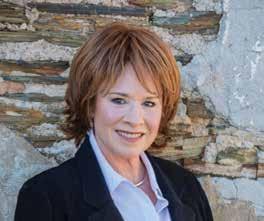
Businesses Supporting the Farm Bureau
To
AGRICULTURAL SUPPLIES
Gallaway Feed and Supply 374-3331
Mariposa Feed & Supply 966-3326
Bootjack Equipment Rental & Feed 966-3545
ASSOCIATIONS
35-A District Agriculture Assn. 966-2432
Mariposa Chamber of Commerce 966-2456
Mariposa County Farm Advisor ........ 966-2417
Mariposa County Farm Bureau ........ 742-5875

CONSTRUCTION
Bucks Construction ........................... 878-3702
Tobey Guenthart Construction ......... 374-3334
FINANCIAL SERVICES
Inter-County Title Company ............... 966-3653
Yosemite Bank 966-5444
HARDWARE STORES
Coast Hardware 966-2527
Foster Ace Hardware 966-2692
MEDICAL
Mariposa Physical Therapy 742-7242
MISCELLANEOUS
Allison Sierra Inc 966-4082
Happy Burger Diner 966-2719
Mariposa Friends of the Fairgrounds Foundation.................... 742-4680
Hugh A. Yamshon Ranch
Mariposa Gun Works ........................ 742-5444
Miners Roadhouse 14 966-2444
Pony Expresso 966-5053
REAL ESTATE
Cathey's Valley Real Estate 742-2121
SERVICES
Chases Foothill Petroleun 966-3314
Edward Lien & Toso Ag Appraisers 634-9484
Palmer Tractor 374-3470
Ranch Fence, Inc. 966-5914
Valley Pacific Petroleum .................... 948-9412
Yosemite Glass & Window Inc. ......... 966-3292
WINERIES
Mount Bullion Vineyard ..................... 377-8450
Rauch Ranch Vineyard & Winery ...... 742-7162
Page 21 Merced County Farm News • December 17, 2022
Support Farm Bureau Member Businesses
be included in the directory, join Mariposa County Farm Bureau as a business member by calling 742-5875.








Page 22 Merced County Farm News • December 17, 2022 Office: 209.378.2300 | Mobile: 209.349.2225 | jwatson@pearsonrealty.com CALIORNIA’S LEADING FARM & RANCH SPECIALISTS For a free consultation please contact: JIM WATSON Pearson Realty, Ag Division Over 15 Years Experience & Service A Tradition in Trust Since 1919 Specializing in: Agricultural Land Transitional Land 1031 Exchanges Cattle Ranches Recreational/Hunting Sales & Service Vertical turbines Domestic pumps End suction booster pumps Sewage & stormwater pumps Multi-stage pumps prefabricated booster systems for domestic, process & landscape requirements. Special metallurgy for all types of fluids. In-house machine shop All popular brands - HazMat 40HR Certified Techs LICENSED, INSURED AND BONDED SERVING THE INDUSTRY FOR OVER 50 YEARS Problem Weed Specialist Custom Weed Control Enterprises Inc. WEED CONTROL “We Use Environmentally Safe Proven Methods.” RESIDENTIAL AGRICULTURAL COMMERCIAL INDUSTRIAL Discing & Clean-up - Pre-Asphalt Application Call Us First! 209 723-2161 est. 1973 We carry Bergstrom & RedDot Fully stocked parts department AC Hoses built on site Ray's Gardening 209-678-3189 AG Towing 24/7 Towing Service 209-445-8503 COMPLETE AUTO BODY SERVICE Domestic and Foreign COMPLETE UPHOLSTERY SERVICE Vinyl Tops, Convertible Tops, Tonneau Covers 923 Martin Luther King Jr Way, Merced Leonard Rich - (209) 723-1022 State of the Art Equipment 80' Truck Scale Maximized Returns Owner Operated Inshell line complete with Satake color sorter High Capacity dryer for bin or bulk loads Since 1986 Peter Verdegaal 209-628-1008 Office 209-356-0210 8016 Winton Way, Winton Serving Stanislaus & Merced Counties M-MIG CONSTRUCTION INC. Serving Merced & Surrounding Counties Specializing in Dairy Construction Steel Buildings Locally Owned & Operated Matthew Migliazzo - Owner Contractors Lic. #870007 291 Business Park Way, Atwater www.mmigconstruction.com 209-724-9488
Merced County Business Member Directory
Businesses Supporting the Farm Bureau
To be included in the directory, join Merced County Farm Bureau as a business member by calling 723-3001.

REPAIRS & SERVICES
AC King 722-3552
Atwater Radiator & Muffler, Inc. 358-2638
Car Plus 722-3552
SS Blue 722-2583
CONSTRUCTION CONTRACTORS
Allison Sierra, Inc. 966-4082
Dias Construction, Inc. 634-9601
Mid Cal Pipeline & Utilities, INC ....... 383-7473
M-Mig Construction, Inc. ................... 724-9488
FARM EQUIPMENT
Garton Tractor, Inc. ............................ 726-4600
Holt Ag Solutions ............................... 723-2021
J M Equipment Co Inc . 386-1797
Kirby Manufacturing 723-0778
Laird Mfg LLC 722-4145
N&S Tractor 383-5888
REAL ESTATE
Flanagan Realty 723-4337 (Merced)
Flanagan Realty (559) 665-1313 (Chowchilla)
Powerhouse Realty Jed Kruppa Team 617-6727
Property Team ................................... 769-4698
Dick Templeton Property Team ........ 761-4441
Valley Real Estate Sales, Inc. 854-1000
GROUPS & ORGANIZATIONS
Blue Diamond Growers ........... (559) 474-2996
California Farmland Trust ....... (916) 544-2712
California Sweet Potato Council 385-7403
California Women for Agriculture 723-5878
Central CA Irrigation District 826-1421
Cortez Growers Association 632-3118
Dos Palos Co-op Gin.......................... 387-4151
Farmers Rice Cooperative ...... (916) 923-5100
Gustine Drainage District 854-6782
Hilltop Ranch Inc. 874-1875
Livingston Farmers Assoc 394-7941
Merced Boosters 761-0815
Merced Irrigation District 722-5761
Merced College Ag Division .............. 384-6250
Turlock Irrigation District................... 883-8205
UCCE Merced 385-7403
Water & Land Solutions 677-4700
FARM SERVICES
A-Bar Ag Enterprises 826-2636
Agri-Valley Consulting 769-2357
Caddy Shack Rodent Servc.....(559) 363-3315
Cal Ag Safety 351-0321
Cal Corn Growers Inc. (559) 665-5775
Chipponeri Electric ............................ 634-4616
Dutch Door Dairy ............................... 648-2166
Farm Management Inc. 667-1011
Guerrero Farm Labor 492-0408
Horizon Farms, Inc. 383-5225
J & F Fertilizer 854-6325
La Follette Enterprises, Inc. 632-1385
Mass Energy Works. (530) 710-8545
Machado Feed Company .................. 658-5943
Maciel & Co 777-0911
Mid Valley Ag Service 394-7981
Modern Dairy 722-7452
Modesto Dairy Supply ....................... 669-6200
Silva & Sons Custom Spreading 667-2566
Stone Family Spreading 756-1491
The Pollination Connection (877) 970-BEES (2337)
FOOD PROCESSING
A V Thomas Produce ......................... 394-7514
Dallas Distributing Co 394-2803
Del Rio Nut Company 394-7945
The Morning Star Company .............. 826-8000
Minturn Huller Co-op (559) 665-1185
Parreira Almond Processing Co. 826-1262
Sensient Natural Ingredients (800) 558-9892
Yosemite Farms ................................. 383-3411
HARVESTING & HAULING
Baldes Hay Co ......................... (559) 718-9714
Bertuccio Hay 761-6247
Castillo Brothers Hay 392-3817
Diamond J Farms 564-0870
Minturn Huller Co-op .............. (559) 665-1185 Northern Merced Hulling 667-2308 Wallace & Son 382-0131
IRRIGATION, WELLS, & SEPTIC
Allison Sierra, Inc. 966-4082
Agri-Valley Irrigation ......................... 384-8494
Dickey's Pump Service 394-3112
Irrigation Design & Construction, LLC387-4500
Pacific Southwest Irrigation 460-0450
Precision Aqua ................................... 756-2025
Quality Well Drillers 357-0675
Rain for Rent/Westside Pump (559) 693-4315 Robal Inc. 826-4540
San Luis Pump Company. ................. 383-0464
Shannon Pump Company 723-3904
INSECT & WEED CONTROL
Environmental Spraying Service 667-1038
Malm Ag Pest Management 392-6905
Star Creek Land ............................... 704-1790
FARM SUPPLIES
Ag Flag .............................................. 357-3424
Cal Farm Service 358-1554
Kellogs Supply 722-1501
Livingston True Value 394-7949
Hardware & Farm Supplies............... 394-7949
Marfab 826-6700
Modesto Dairy Supply 669-6200
Stanislaus Farm Supply 723-0704
ORCHARD REMOVAL
Custom Farm Services 358-1759
FUEL SERVICES
Amarants Propane Service 358-2257
Hunt & Sons, Inc. (916) 383-4868
Western States Petroleum Assoc. ........... (661) 321-0884
Valley Pacific Petroleum 948-9412
Van De Pol Petroleum 667-0236
INSURANCE
Barlocker Insurance 383-0220
Fluetsch & Busby Insurance 722-1541
Rico, Pfitzer, Pires and Associates .. 854-2000
Walter Mortensen Insurance 353-2700
Western Valley Insurance 826-5667
Winton Ireland Insurance 394-7925
FINANCIAL SERVICES
Alice B. Contreras CPA 722-6778
American Ag Credit 384-1050/826-0320
Central Valley Community Bank........725-2820
Grimbleby Coleman CPAs 527-4220
Trans County Title Company 383-4660
Yosemite Farm Credit 383-1116
MISCELLANEOUS
Berliner Cohen LLP 385-0700
The Hat Source 357-3424
Merced County Fair ........................... 722-1506
P. B. Iyer, M.D. 854-1120
Razzari Auto Center. 383-3673
Unwired Broadband (559) 336-4157
BUSSINESS SUPPORT FARMERS
DCB Farming LLC
J&J O'Banion Ranch, LLC
Jorgensen Ranch
Live Oak Farms
Migliazzo Farms
Nicholas Calf Ranch
Page 23 Merced County Farm News • December 17, 2022

Page 24 Merced County Farm News • December 17, 2022




 Joe Sansoni
Joe Sansoni







 By: Kaitlin Dores, Gustine FFA Reporter
By: Kaitlin Dores, Gustine FFA Reporter


























 By: Alexxis Rudich, YF&R Secretary
By: Alexxis Rudich, YF&R Secretary






 By: Jacky Velazquez, Atwater FFA
By: Jacky Velazquez, Atwater FFA

 By: California FFA
By: California FFA












